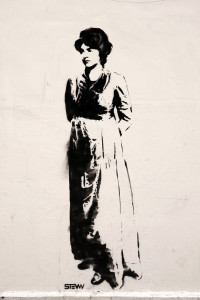by Bridey Heing
In her BBC documentary and forthcoming book, historian and author Amanda Foreman uncovers the historical precedents that have erased women throughout human civilization.
History has long been a boys’ club, from the people being written about to the people writing the books. But historian and author Amanda Foreman is out to change that. With her recent four-part series on BBC aptly called “The Ascent of Woman,” she told the story of women in civilization in four parts. That, however, was just a warm-up. Her upcoming book, The World Made By Women: A History of Women From the Apple to the Pill, is the story of humanity from the perspective of the female half.
Here, Dr. Foreman shares her thoughts on the origins of patriarchy, the historical conspiracy responsible for silencing women, and the figures hidden in history whom we should all know more about.







